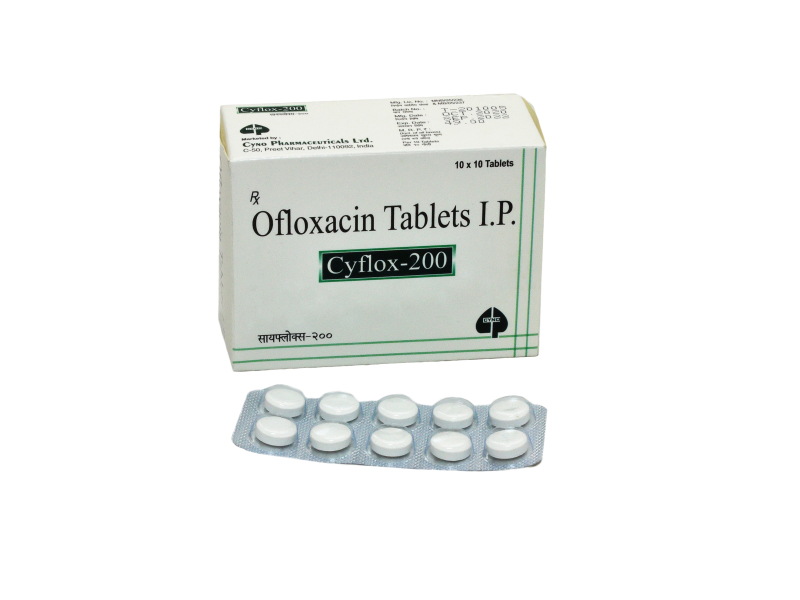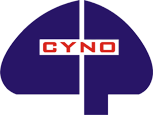CYFLOX- 200
Ofloxacin (200 mg)
Cyflox 200 mg is used in treating bacterial infections of the urinary tract, nose, throat, skin and soft tissues, and lungs (pneumonia). It cures the infection by stopping the further growth of the causative microorganisms. This tablet is an antibiotic. It may be taken with or without food, Avoid skipping any doses and finish the full course of treatment even if you feel better.
Ofloxacin is a quinolone antibiotic useful for the treatment of several bacterial infections. When taken by mouth or injected into a vein, these include pneumonia, cellulitis, urinary tract infections, prostatitis, plague, and certain types of infectious diarrhea.
Ofloxacin is used to treat certain infections including pneumonia, and infections of the skin, bladder, reproductive organs, and prostate (a male reproductive gland).

Mechanism of Action
Ofloxacin is a bactericidal drug. This enzyme acts by inhibiting DNA gyrase and topoisomerase 4.DNA gyrase which helps in the creation of a highly condensed three-dimensional structure of DNA, by its nicking and closing activity and introducing negative supercoils to the DNA double helix. Ofloxacin inhibits DNA gyrase resulting in the abnormal linkage between open DNA and gyrase and also inhibits negative supercoiling. This will inhibit the transcription of DNA in RNA and later protein synthesis.
Onset Of Action Within 0.5 hour
Half-Life 5 – 8 hours
Indications
1. Bronchitis 2. Pneumonia 3. Urinary tract infection 4. Bone and joint infections 5. Intra-abdominal infections 6. Gonorrhea 7. ENT infections 8. Skin and soft tissue infections 9. Typhoid fever 10. Prostatitis 11. Otitis 12. Gynecological infections 13. Conjunctivitis 14. Keratitis
Pharmacokinetic Properties:
Absorption: Ofloxacin is rapidly and completely absorbed after oral administration. Distribution: It is widely distributed in the body. Metabolism: It undergoes lethal metabolism. Excretion: The drug is excreted mainly through urine.
Drug-Drug interactions:
Oral anticoagulants: The effect of oral anticoagulants can be enhanced. Theophylline: Increased plasma levels of theophylline, resulting in toxicity. NSAID`s: CNS stimulation may occur.
Precautions:
1. Hepatic debility 2. Kidney weakness 3. Brain arteriosclerosis 4. Epilepsy 5. CNS disease 6. Avoid exposure to sunlight. Use caution when driving a vehicle or operating a machine or engaging in any dangerous activities.
Breastfeeding: Contraindicated
Fertility:
Do not take Ofloxacin if you are pregnant or breastfeeding, think you may be pregnant, or are planning to have a baby. If you become pregnant while taking Ofloxacin, stop taking the pills and contact your doctor immediately.
Dosage:
Adult: 200 – 400 mg/day depending on the severity and type of infection. Bronchitis, pneumonia, skin and soft tissue infections: 800 mg/day in 2 divided doses for 10 days. Gonorrhea: 400 mg as a single dose. Prostatitis, cervicitis, and urethritis: 600 mg/day in 2 divided doses for 1 week. UTI: 200 – 800 mg/day in single or divided doses.
Duration of action:
12 – 16 hours
Adverse Reaction:
1. Nausea 2. Vomiting 3. Diarrhea 4. Abdominal discomfort 5. Constipation 6. Dry mouth 7. Dizziness. 9. Headache 10. Eczema 11. Pseudomembranous colitis 12. Visual disturbances 13. Insomnia
Storage: Store at 15 – 30 degrees C in a tightly closed container.
Overdosage:
Give supportive measures and symptomatic treatment. Gastric lavage has to be done.
Contraindications:
Hypersensitivity to Ofloxacin and other Fluoroquinolones
Warnings:
Fluoroquinolones have been associated with inefficient and potentially irreversible serious adverse reactions that have occurred simultaneously: tendinitis and tendon rupture, peripheral neuropathy, and central nervous system (CNS) effects.
Pregnancy: Contraindicated
Old Age Use with caution
Children Contraindicated
Neonates: Contraindicated
